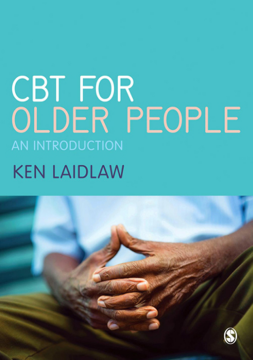
Additional Information
Book Details
Abstract
Going beyond simple procedural modifications, this is the first book to address how the application of gerontology to CBT practice can augment CBT’s effectiveness and appropriateness with older people. Taking you step-by-step through the CBT process and supported by clinical case examples, therapeutic dialogue, points for reflection and hints and tips, the book examines:
- basic theoretical models in CBT and how to relate them to work with older people
- main behavioural interventions and their practical application
- social context and relevant theories of aging
- implications of assessment, diagnosis and treatment
- issues of anxiety, worry and depression, and more specialist applications of CBT for chronic illnesses
- latest developments, thinking and empirical evidence.
This is an invaluable companion for any clinical psychology, counselling, CBT/IAPT, and social care trainee or professional new to working with older people, especially those who are keen to understand how the application of CBT may be different.
Professor Ken Laidlaw is Head of the Department of Clinical Psychology, University of East Anglia.
I found the style of writing easy to read and the author clearly engages with the reader in a meaningful way. The frequent use of case studies makes application of theory to real life situations much easier for the reader and the summaries and learning logs/reflection sections at the end of chapters are really useful.
This is a great book for anyone with an interest in exploring the benefits, practices and challenges of use of CBT with the older person
Traci Whitfield
This book is a thought-provoking, accessible introduction to CBT for older people. Adults are living longer and CBT therapists need to understand the late-life journey before they experience it themselves. This book maps the territory in a highly informative and engaging way. It offers a high-quality integration of theory, evidence and practice with numerous learning opportunities for trainees and experienced therapists. The author dispels the myths of late life misery, at the same time illuminating the particular needs of older people struggling with emotional difficulties. The richness of the case material makes the key points clear, relevant and above all usable. Cognitive behavioural therapy has to be developmentally-sensitive – this book addresses a growing need in a sophisticated and practical way.
Dr Stephen Barton
Postgraduate Diploma in Cognitive Behavioural Therapy, Newcastle University
Without question, this is the definitive guide for using Cognitive Behavioural Therapy (CBT) effectively with Older People. This book will challenge assumptions, provides effective and practical strategies from gerontology to augment CBT techniques and is written in an accessible and user friendly format by the leading expert for CBT for Older People in the United Kingdom. It is loaded with the most up to date strategies and interventions and is written with authority and passion for the subject. I cannot recommend this book highly enough for all CBT therapists, psychologists and practitioners working in a CBT format with Older People. Prepare to be challenged on your own views of ageing, think critically about what successful ageing means and to feel confident to work skilfully and creatively with this client group.
Marie Chellingsworth
An up to date work by Professor Ken Laidlaw that reflects his large clinical experience and provides valuable assessment and practical tools for professionals working with older adults. I would recommend it for practitioners as well as for students. In addition, it is very enjoyable reading.
Prof. Andrés Losada
The eleven chapters cover a range of relevant and useful topics, from basic to complex presentations, including clients with mild to moderate dementia. It integrates theory with practice, and includes a number of helpful case studies.
Ian James Andrew
This book gives an excellent exposition of using cognitive behavior therapy with older people. It is accessible and encourages active engagement with the material. All the cases are highly illustrative and give a good idea of the problems people ask for help with. I would highly recommend this book to any learner, teacher or practitioner of CBT in any mental health profession.
Ann Wills
